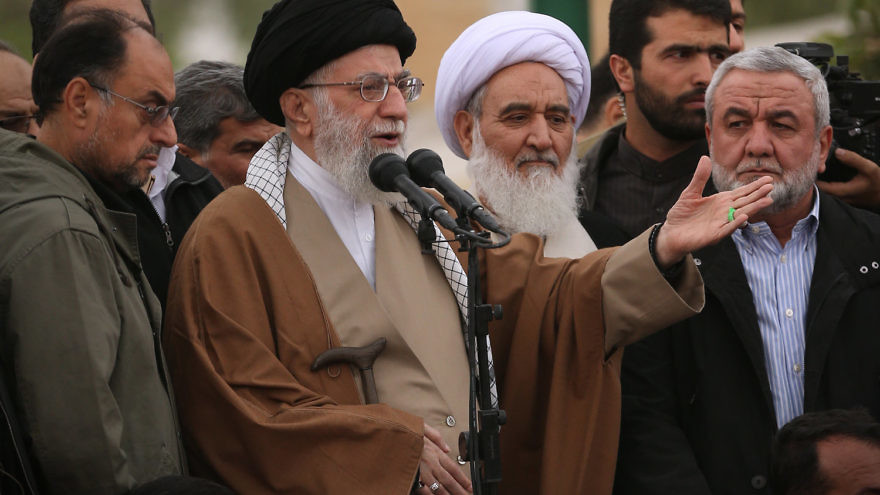Iran’s Ayatollah Ali Khamenei rejected U.S. President Donald Trump’s unconditional offer on Monday to talk about relations between the two countries, as the U.S. reimposed sanctions last week on the regime, which is facing upheaval from civilian protesters.
The Supreme Leader of Iran also blasted the Iranian government for mismanaging the country’s economy amid the U.S. sanctions, which were lifted under the 2015 nuclear deal.
“America’s withdrawal from the nuclear deal is a clear proof that America cannot be trusted,” Khamenei added at a gathering of thousands of Iranians.
His word is law in the theocratic regime.
“The Supreme Leader is doing President Trump an enormous favor by showing the international community and the people of Iran that he has no interest in diplomacy,” Richard Goldberg, former deputy chief of staff and senior foreign-policy adviser to former Illinois Sen. Mark Kirk, told JNS. “As the administration ratchets up its pressure campaign and insists on compliance with U.S. sanctions, this statement will become a helpful diplomatic talking point.”
Khamenei lamented the re-imposed sanctions, which target Iran’s transactions in gold and other precious metals, in addition to its purchases of American dollars and the U.S. car industry.
“More than the sanctions, economic mismanagement [by the government] is putting pressure on ordinary Iranians,” Khamenei said, according to state TV. “I do not call it betrayal, but a huge mistake in management.”
Khamenei’s remarks come as the United States is expected to ratchet up additional sanctions later this year that bar Iran access to financial messaging services, known as the Society for Worldwide Interbank Financial Telecommunication (SWIFT).
Senior European officials want to protect Iran’s access to SWIFT, but the White House is considering sanctioning SWIFT officials if they maintain Iran’s utilization of the system, according to Axios.
“Cutting off Iran from SWIFT is critical for a maximum pressure campaign to succeed,” said Goldberg, who was the lead Republican negotiator for a few rounds of sanctions targeting SWIFT and other aspects of the Iranian economy. “We saw the damage inflicted on Iran’s economy in 2012 when sanctions on the Central Bank of Iran were combined with a cut-off from SWIFT.”
“It’s important to remember that returning to that level of sanctions isn’t the intended end point,” he continued. “It’s the intended starting point for pressure going forward. That’s why the Trump administration will most certainly use all its authorities to pressure SWIFT into compliance.”
Regarding the latest protests in Iran, Goldberg said it is early to predict what will come of them.
Thousands of Iranian citizens have been protesting across the nation, including in major cities such as Tehran, over the apparent and imminent crashing of its economy, which began after the first of two phases of the re-imposition of U.S. sanctions taking effect following Trump’s decision to withdraw from the Iran deal last May.
Questions to ask, according to Goldberg, include “Will more people join the protests over time? Will security forces come to a point where they refuse to kill their fellow Iranians? Will the general population begin to coalesce around a credible plan for what might come next should the regime fall?”
“These are all important questions that policymakers need to be asking right now,” said Goldberg.


























